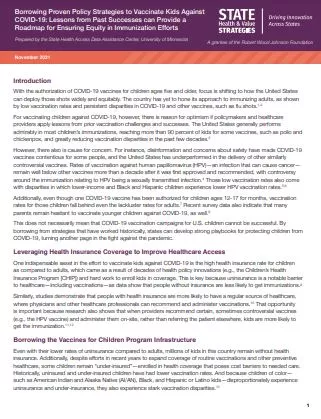With the authorization of the first COVID-19 vaccine for children age five and older, most kids in the United States are now eligible to be immunized. Recent experience with other vaccines—measles and chickenpox, for example—shows the country is capable of vaccinating kids widely and equitably, but the challenges that have emerged in the effort to vaccinate adults against COVID-19 also demonstrate that success will take planning and hard work.
In order to meet their COVID-19 vaccination goals to vaccinate kids against COVID-19, states can borrow strategies that have historically proved effective in immunizing kids against other contagious diseases and resulted in dramatic reductions in certain vaccination rate disparities.
This issue brief, produced for State Health & Value Strategies with funding from the Robert Wood Johnson Foundation, highlights strategies and tools that have led to prior successful U.S. efforts to achieve high childhood vaccination rates—and dramatic strides toward health equity—and it identifies how those strategies could be applied in the context of the current COVID-19 crisis.
Key strategies:
- States can leverage children’s higher rates of health insurance to facilitate COVID-19 vaccination in traditional health care settings, where clinicians can educate parents and kids on vaccine benefits and administer them immediately.
- Vaccines for children-enrolled providers offer a ready infrastructure for immunizing uninsured and under-insured children.
- State Medicaid programs can promote vaccination by setting COVID-19 immunization rate targets for MCOs and health care providers.
- States can disseminate and encourage evidence-based practices (e.g., the 4 Pillars Immunization Toolkit) to help health care providers improve immunization rates.
- Implementing immunization requirements for children to attend schools or childcare has shown to result in higher vaccination rates.
Unlike adults, the U.S. has a proven playbook of initiatives for vaccinating children widely and equitably. States can and should borrow those evidence-based strategies in order to protect children and communities against COVID-19 through successful vaccination.
Click on the image above to read the full brief.

